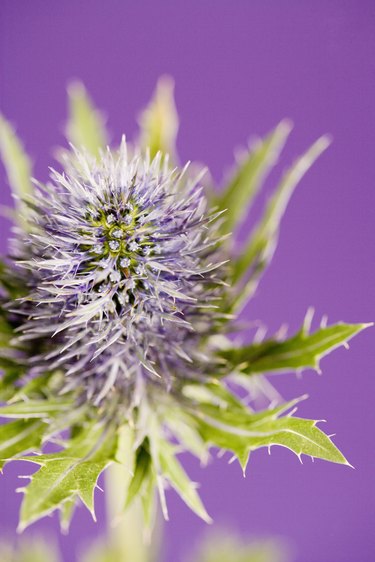Things You’ll Need
-
Measuring cup
-
Pruning shears (optional)
-
Spray bottle
-
Boxes or cardboard (optional)
 You might want to wear gloves when dealing with thistles. Image Credit: Polka Dot Images/Polka Dot/Getty Images
You might want to wear gloves when dealing with thistles. Image Credit: Polka Dot Images/Polka Dot/Getty Images
Thistles, such as Canadian thistles (Cirsium arvense), hardy in U.S. Department of Agriculture plant hardiness zones 2 through 8, are perennials that can become pesky weeds. Although traditional herbicides might be your best bet to get rid of thistles, you might prefer a home remedy, such as bleach or vinegar. Because thistles spread through seed and underground rhizomes, they can be difficult to kill. No matter the chosen method, reapplication is likely necessary to kill an established thistle colony.
Banishing with Bleach
Step 1
Measure 1/2 cup of undiluted bleach for each thistle plant. This amount of bleach helps ensure that it reaches the thistle's roots.
Step 2
Pour 1/2 cup of bleach around the base of each thistle plant. This will be most effective when the thistle is actively growing from spring until fall. Also, rain should not be expected for at least one day.
Step 3
Cut back or pull the thistle from the ground once it dies back. Reapply the bleach if the thistle continues to grow or resprouts.
Vanishing with Vinegar
Step 1
Pour vinegar into a spray bottle. A concentrated solution that contains 10 to 20 percent acetic acid is much more effective than standard household vinegar, especially against older, established thistles.
Step 2
Cover nearby plants with boxes or shield them with cardboard so you do not overspray the vinegar onto desired plants. The vinegar can harm or kill them as well.
Step 3
Spray the vinegar directly on the foliage and stems of the thistle plants. Perform this task on a calm day when the thistle is actively growing from spring until fall, and when rain is not forecast for at least one day
Step 4
Pull the thistle from the ground or cut it back once it dies. Respray the thistle with the vinegar if it resprouts or continues to grow.
Tip
Flush the soil with at least 2 inches of water to help send the bleach or vinegar deeper into the soil so you can try to grow other plants, if desired.
Warning
Bleach is effective in killing thistles, but it raises the pH level of the soil so high that it might be difficult to grow plants in the same location afterward. Bleach is also not a good choice if the thistle is growing next to desired plants.


